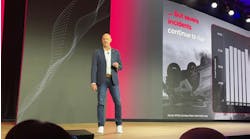Giuliani speech you didn't hear: Not just your IT security, it's your connections
Right after speaking at the Republican National Convention this week, former New York City Mayor Rudy Giuliani found another appearance important enough to catch a night flight to before returning straight back to Cleveland.
It was the BlackBerry Security Summit in his home city. As an uncompensated speaker — and a somewhat hoarse one at that — Giuliani discussed his long ties to the company and noted he's working with BlackBerry in providing cybersecurity solutions for his consulting firm's clients. Those have included the likes of nuclear power plants, desalination plants and the government of Colombia.
Though there's still a long ways to go, businesses and organizations of all kinds know at least to consider their own IT security. But the former mayor and presidential candidate made another point: How about all those clients and individuals with whom you exchange information?
"You want to see the 14 drafts of my speech [at the convention]? Hack my secretary," Giuliani quipped. "If my devices — phone, tablet, everything we have now — are secure, but my secretary's aren't, they can steal everything I have through my secretary or from a person my secretary is communicating with," he told summit attendees.
At this point, the Internet of Things (IoT) is exploding with new possibilities that are enticing businesses of all kinds — those involved in trucking and transportation are a particularly growing example — to streamline and improve processes, provide better service and/or save costs. And that's the problem, Giuliani said, because the things that can be done today with data and information are advancing much faster than they're being properly secured.
"The things we can do with information, our ability to analyze and use information, are moving at leaps and bounds," Giuliani contended. "It's moving, moving, moving. But in most cases, all these great inventors and creators — all these terrific people who are moving, moving, moving — they don't think security.
"So our ability to gather, analyze, use and interrelate information is way ahead of our ability to secure that information," he continued.
Like cancer
Giuliani likened businesses' and nations' efforts to deal with cybersecurity threats to detecting and treating cancer.
"It's a little like that. We can't yet cure [cancer]; God willing, we will be able to someday," he argued. "But if we catch it early, we can put it into remission. And sometimes, if we catch it very early, we can cure it."
Cybercrime — which Giuliani said breaks down into more traditional theft and criminal activity as well as disruptions of infrastructure and such that threaten to take down nation-states and organizations — is growing by "anywhere from 20-40% in almost every country in the world" each year in both those regards.
"But if you can catch [cyberattacks] early, you can ameliorate an enormous amount of the damage they're going to do," he said. "They longer they (cybercriminals) are in the system, the more information they can get; the shorter they're in the system, they may get nothing."
Disruptive cybercrime activity can be applied to many businesses, Giuliani explained, and the point is to get control of operations in some way and effectively hold a company hostage for crooks' monetary or other gain. He used an example of a hospital.
"Can you imagine ransom of hospitals?" he posed to the audience. "They might get control of a system and [extort] 50 grand from you, or else none of your systems will work — the ones that are monitoring the amount of medicine people get, the ones monitoring what's going on in the operating room, the ones monitoring what's needed for a patient in the next hour and the one after that."
With the rapid change and uses of information technology and the IoT — which more accurately should be thought of in the plural, "Internets of Things" — what's needed is to find the digital information equivalents of all the safes, armed guards and other methods and practices that've long been used to protect physical information.
Giuliani listed steps organizations should take in addressing their IT security:
1. Data, information and systems must be secured from within, including "providing protection for all your people."
2. Monitor for cyberattacks and systems penetration. "Most of the companies that do that say they're about 50% successful," Giuliani noted.
3. Examine and probe for weaknesses in your systems at all data touch/connection points like the hackers do, "trying to pick up some of the 50% [of systems breaches and attacks] that they miss."
4. Consider and engage in using devices others may use in accessing your information. "You need [cybersecurity] vendors who know how to look for your kind of information and focus in on your kind of problems," he contended.
5. Prioritize cyber threats. "We get attacked so many times every day that we can't trace down every one; it can't be done," said Giuliani.
6. Investigate cyberattacks. "When we get that kind of information about who's coming after us and why they're coming after us, you need to actually do good, old-fashioned detective work with cyber detectives."
From governments to mom-and-pop business
Recalling his tenure as mayor, Giuliani spoke of BlackBerry's roots in both telecommunication and security, including how the company enabled communications during and in the aftermath of the Sept. 11, 2001 terrorist attacks on the World Trade Center, even after telephone land lines were useless.
"You know what worked? You know what saved us? You know what saved the lives of many people, including some of my firefighters and police officers?" he asked. "We had BlackBerrys and their point-to-point service." During the session, the audience also had heard of BlackBerry's continuity of secure communication in other emergency and disaster situations like the massive 4.6-magnitude earthquake that struck near Haiti's capital of Port-au-Prince in 2012.
"I'm talking to you about BlackBerry the security solution, which has always been there — it's always been hand-in-hand [with BlackBerry handsets] — but now actually has become much more important," Giuliani said. "It's much more important no matter what phone you're using, no matter what phone you buy, no matter what system you have."
The former NYC mayor said a more effective — eventually reaching 100% — cybersecurity solution has become a crusade for him and "what I want to contribute to my country now." And while all organizations are different, he said that the best cybersecurity at the highest-risk needs like national governments or power grids will help design systems for all organizations and businesses.
Will such a foolproof cybersecurity solution ever come about? "It isn't impossible, and as we do more and more of it, we can start to get down to more regularized, more institutionalized solutions," Giuliani said.
"This is going to be the challenge of our next 10-15 years: For our security to catch up with our ability to use, store and gather information," he told listeners. "BlackBerry is at the cutting edge of that, and I'm working with them to make sure that those solutions fit my clients."



